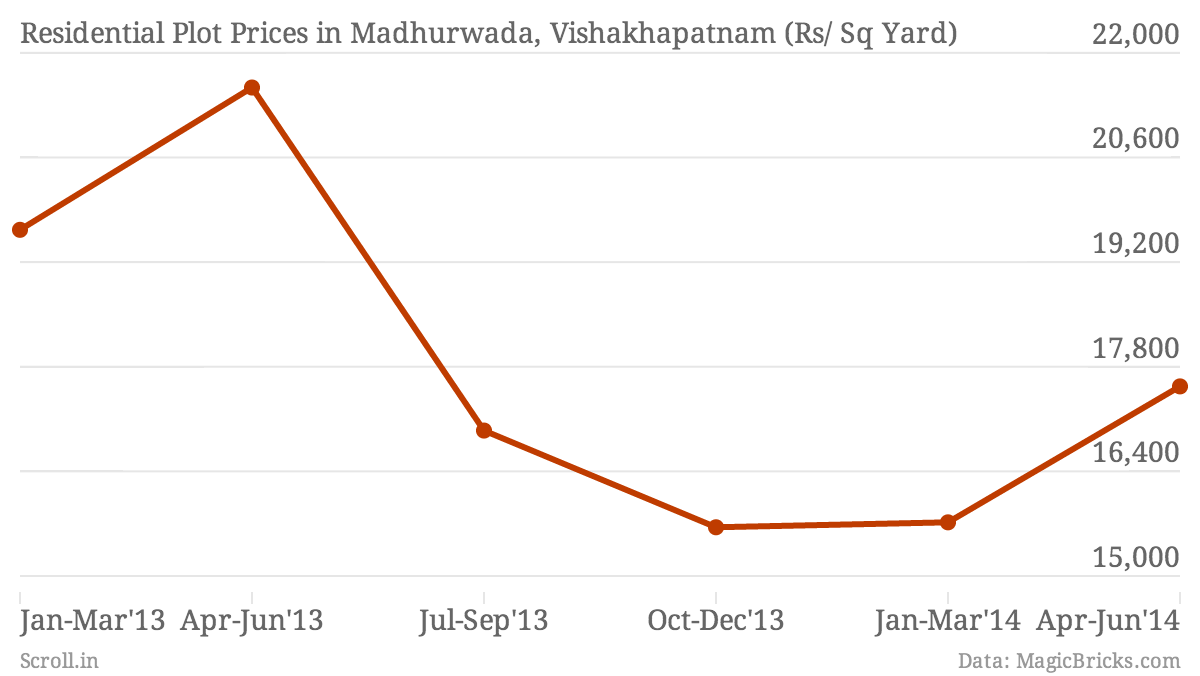Under the terms of the bifurcation deal, Hyderabad was to become Telangana's capital. But Andhra Pradesh would have to build itself a new administrative headquarters ̶ and no one was quite certain where it would be located. Prasad made his bets on Gannavaram, a town in the Krishna district of Andhra Pradesh 20 kilometers from Vijayawada.
When Andhra Pradesh Chief Minister Chandrababu Naidu confirmed this week that the capital would be in the Vijayawada-Guntur-Mangalagiri-Tenali region, Prasad's wager paid off. Real-estate prices, which have been shooting up over the past months, are set to rise even further. Prasad owns a patch of land in Gannavaram that was valued at Rs 20 lakh per acre four years ago and at Rs 60 lakh per acre at the time the state was bifurcated. It is now going for Rs 2 crore.
Speculation that the capital would be located in the Vijayawada area has driven buyers to stock up on agricultural land, which they anticipate could be converted for residential, commercial or industrial use. “After many reports in newspapers and the electronic media that the capital be in the Vijayawada-Guntur area, people in agriculture and those in real estate have bought land and the prices have gone up three or four times,” said A Siva Reddy, president of the Vijayawada chapter of the Confederation of Real Estate Developers’ Associations of India.
Vijaywada was frontrunner


The creation of the new capital presents some challenges. A report submitted last week by a committee constituted to look into the location and development of Andhra's new capital city headed by former secretary of urban development KC Sivaramakrishnan expressed its concern about the impact of further urbanising the Vijayawada-Guntur-Mangalagiri-Tenali region. The fertile agricultural district gives Andhra Pradesh much of its wealth. In Guntur, 65% of people are farmers and agricultural labourers. In the Krishna district, the figure is 56%.
These coastal districts have a high water table, much of it due to recharge by water from paddy fields. The wetlands of the Krishna–Godavari river deltas are ecologically sensitive areas.
Environmental fears
KT Ravindran, member of the Sivaramakrishnan committee and dean emeritus of the RICS school of urban planning at Amity University, is worried about the land rush in Vijayawada and feels that it is imperative for the government to regulate land use before drawing up development plans. “You cannot invest money without regulation," he said. "It’s suicidal because it will completely kill its agricultural base.”
The Sivaramakrishnan Committee has suggested that the government rethink its present land use policy, one that has allowed a ring road to cut through farmland in the Vijayawada-Guntur-Mangalagiri-Tenali region. Ravindran says that a new land use policy should ensure that farms are left untouched. “Loss of paddy fields means a loss of food security and water security," he warned. "You can always say that you will have canals and all that but that is creating a problem and then having to solve it at huge costs.”
Meanwhile, farmers are looking to hit jackpot in the realty rush. Prasad says his neighbours are waiting to see how much higher their land values climb. “As far as I know, the difference between day before yesterday and today is 20%,” he said.










